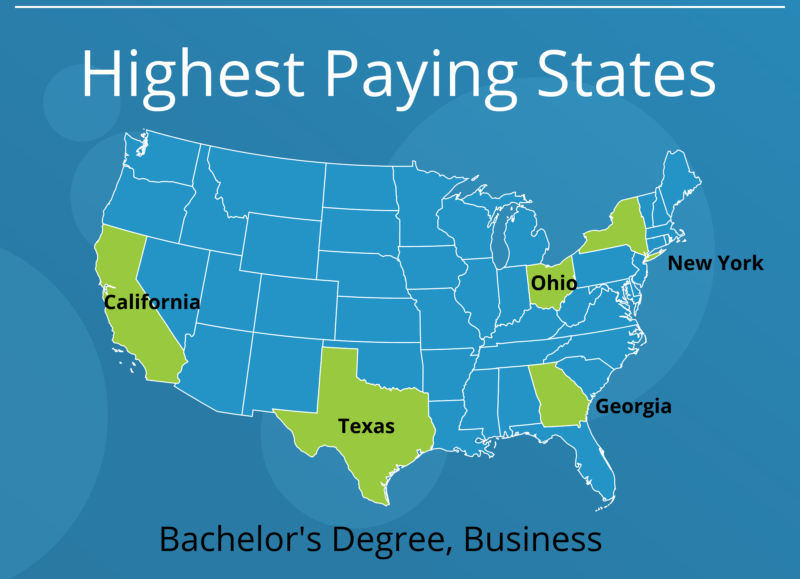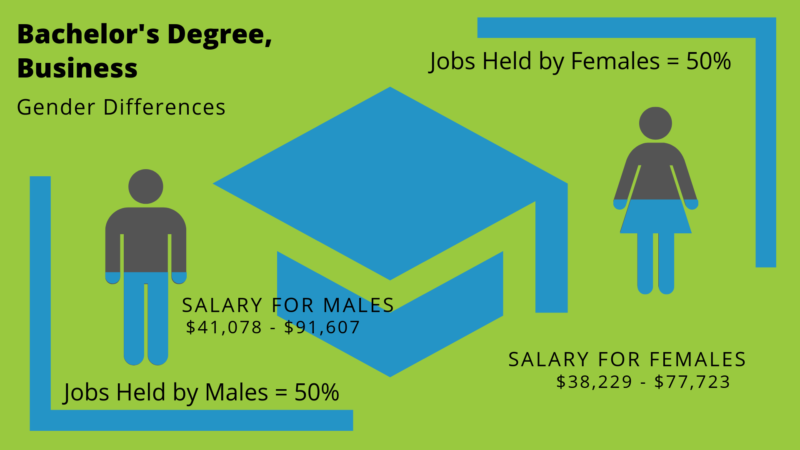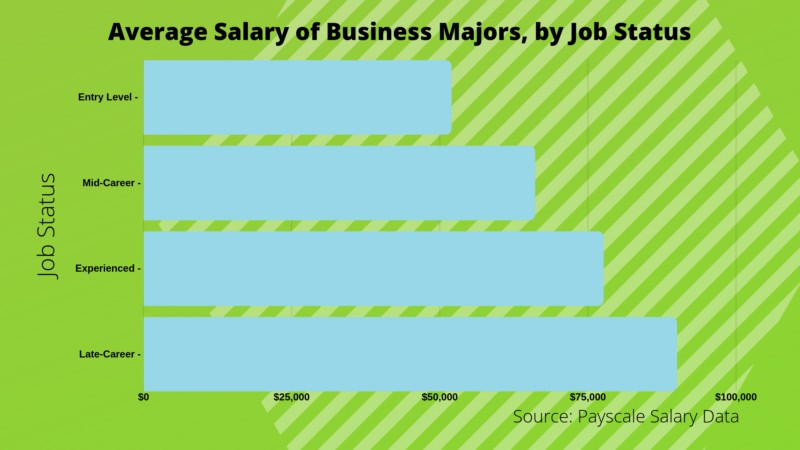Many people will want to know why they should pursue a bachelor’s in business degree before they start the process. Many misconceptions about business degrees exist, but most of those center around questions like:
- What is business administration and management?
- Is a business degree hard to achieve?
- Is business administration a good major?
- Is a business administration degree good?
- Is a business management degree good?
A business degree is one of the most versatile and useful degrees available. Is a business degree hard to achieve? It is no more or less harder to achieve than any other type of degree. Any students who want a business education, and applies themselves, will certainly manage to gain their bachelor’s in business.
What Should I Know about a Bachelor’s In Business?
One that can confuse potential students is the number of different business degree types available. Since business can apply to literally anything, there are numerous courses available that can feature business as a minor or a major.
Related:
- Best Bachelor’s in Business Administration degrees
- Best Bachelor’s in Finance Degree Programs
- Best Bachelor’s Degree in Finance Online Programs
- Cheapest Online Business Bachelor’s Degrees
Even with a business major, there are several disciplines, specializations, and paths of study that can lead to different types of business degrees. For example, some marketing degrees can count as a business degree, as can an accounting degree. The thing that differentiates a business degree is that it will usually come as a BBA, or bachelor of business administration.

The business administration definition includes any preparatory course that helps an individual learn to supervise, oversee, or administer business operations. Within that business administration definition comes a ton of skills that applicants can apply to any industry.
What is business administration and management? Since business encompasses various practices and principles, students will learn finance, commerce, marketing, project management, accounting, economics, and other things necessary to business administration.
Learning aspects of all these things is one of the reasons why people ask is a business degree hard. However, these things all go together and a business degree major shouldn’t have trouble fitting them together as they move along with the curriculum.
The major benefits of studying business administration comes from the sheer amount of knowledge the degree program can give a student. That knowledge translates directly into real-world use and application, which can help in any occupation.
Is a business management degree good? Is business administration a good major? Yes, and yes. Given the sheer amount of things covered, business administration is one of the best majors to consider.
How to Tell If a Business School is Good or Has Proper Accreditation?
When deciding on which business school is the best one for a person’s needs, it’s important to first look at the school or program’s business accreditation status. When it comes to institutes of higher learning, the proper business accreditation makes a huge difference.
Accreditation from proper accrediting bodies is like a stamp of approval on the school or program. This is important as that stamp of approval means the school meets or exceeds educational and other standards set by government groups and leaders in the industry.
A lack of accreditation or accreditation from an unrecognized accrediting group is a sign that the school or program may lack the quality standards set by the more well-known groups. In addition, many employers and industry professional take a degree from an accredited school or program very seriously.
Business schools and programs should at least have both regional accreditation and programmatic accreditation. Other forms of accreditation, such as national accreditation, are welcome as well, as long as they exist in concert with the other forms of accreditation. For example, applicants shouldn’t feel forced to choose between AACSB vs regional accreditation if a school or program has both.
Regional Accreditation
Regional accreditation means one of the agencies overseeing a region of the country has the recognition of the US Dept. of Education. Regional accreditation can help students that need to transfer credits to another school with regional accreditation.
However, these accreditations are for schools as a whole. An otherwise excellent school with full regional accreditation can still have a poor business program. For this reason, it’s important to also look for programmatic or specialized accreditation.
Programmatic or specialized accreditation goes to departments, programs, or other individual forms of education that serve a specific purpose. For business programs, there are three main business accreditation groups applicants should look for.
The Association to Advance Collegiate Schools of Business – AACSB
The AACSB is the oldest and most recognized of the business accreditation groups. This group sets standards for research-based institutions and the faculty. That means AACSB accredited schools will likely have faculty who do research, publish papers, and delves deeply into the fundamentals and theories of business practices.
AACSB accreditation standards are high. Industry professionals understand a business degree from a program with AACSB accreditation holds a lot of weight. Some of the best schools in the nation have the distinction of having AACSB accreditation.
For those seeking a school of note, one with AACSB accreditation standards will typically prove that particular school’s business degree program is worthy of consideration. Nevertheless, AACSB accredited schools aren’t the only ones that offer high-quality education.
The Accreditation Council for Business Schools and Programs – ACBSP
Business schools and programs with ACBSP accreditation tend to have educators who want students to succeed in the given program. That is to say, the standards set by the ACBSP focus on effective teaching more than it does on research and research publishing.
But, is ACBSP accreditation respected? A program or school with ACBSP accreditation will offer a high-quality education from teachers and professors. Those educators will want their students to focus on achieving a successful outcome through study and mastery of the coursework. Industry professionals do recognize and respect ACBSP accreditation.
Many people wonder is ACBSP accreditation good or bad because it’s not mentioned as often as AACSB accreditation. However, what is AACSB accreditation mean to employers and others who want to hire someone with a solid working knowledge of a business discipline rather than a scholarly, theoretical, or research-based understanding?
International Assembly for Collegiate Business Education — IACBE
IACBE is the youngest of the main business accreditation groups. This group came into being as a response to the needs of executive-level professionals who wanted people to come into the industry after receiving an outcome-based education.
Such an education from IACBE accredited schools revolves around missions and goals. Students of business programs with IACBE accreditation can expect an education that helps them solve problems effectively. The IACBE accreditation group favors programs with instructors who can teach students precisely what they need to know to create goal-oriented graduates.

What Are the Different Types of Business Management and Administration Degrees?
A bachelor’s in business management can come in a number of forms. With business as an undergraduate major, a BS in business management can have a designation of:
- BBA – Bachelor of Business Administration
- BSBA – Bachelor of Science in Business Administration
- BABA – Bachelor of Arts in Business Administration
Each of these types of bachelor’s in business management come with business administration courses that cater to different aspects of business overall. For example, BBA subjects tend to include a broader overview of business administration. Students will delve into a little of everything when it comes to overseeing a business. The BBA subjects have a lot of overlap with other types of business administration courses.
The BSBA, Bachelor of Science in business administration subjects tend to adhere more closely to core courses consisting of math, statistics, analytics, and similar studies. By contrast, the BABA contains more liberal studies in addition to the business classes. From this viewpoint, applicants can think of the BBA subjects as a middle ground between the BSBA and BABA.
That is because the BBA scope focuses on producing well-rounded business majors, but that does not mean the other degree types will produce inferior students. The BBA scope isn’t all-encompassing. Business is a big subject, and business administration subjects span a vast number of fields.
All a potential student would have to do is take a look at any business administration subjects list. A business administration subjects list will show a host of similar classes whether the applicant is considering a BA vs BBA, BBA vs BSBA, or BA vs BS business of any type. There are some general rules applicants can use to choose between these types of degrees.
BBA provides an overall education in business, and benefits people who want to pursue more general business pursuits. For example, the BBA is good for those who want to gain entry into business-related occupations that don’t have a strong focus on hard sciences or advance math. These occupations can include operations managers, event managers, bookkeepers, coordinators, and other administrators. This is one of the main BBA vs BSBA differences.
A BSBA will benefit those who want to enter the field with a strong scientific or mathematical understanding of business management. The ideal jobs for BSBA degree holders include things like analysts, accountants, managers, economists, and consultants.
The BABA curriculum favors those who want a strong business foundation, but aren’t sure exactly how they want to apply that business knowledge. Since the degree also offers many liberal arts classes, holders of a BA may use the degree to enter into positions that need business talent but also an understanding of people or culture. These degree holders work well in public relations, marketing, compliance, and other business careers that require personal relationship building. These are the types of things that separate the BA vs BBA degrees.
All three of these degree types can help someone move forward into the business field or help them with their own business aspirations. A BS in business management or a BA from business administration classes can all help someone with their goals. The business administration degree requirements can also play a role in which type of degree program to choose.
Can You Earn A Business Management and Administration Degree Online?
Everything concerning business degrees also applies to earning a bachelor’s in business online. People can certainly seek an online bachelor’s in business, but they have to show just as much care as they would for a residential bachelor’s in business. To start with, a bachelor’s in business online will require just as much work, dedication, and consideration.
Applicants should not seek the cheapest online business degree. It’s easy to assume an online bachelor’s in business will cost less, and in some cases, that’s true. However, an online business degree cost can match or exceed some offline schools and programs.
Still, an applicant shouldn’t only base their decision of choosing online business administration classes strictly on online business degree cost. The cheapest online business degree isn’t always the best, but neither is the most expensive business administration online degree.
This also holds true for those who want a business degree online fast. Accelerated degree programs do exist, but all the same criteria for choosing the right school or program still matter.
Before choosing a business administration online degree program, applicants should make sure it’s an accredited online business management degree program. Just like anything else, accreditation matters, even for online business degrees.
An accredited online business management degree will have the same level of quality and high standards as any school with proper accreditation. Applicants should choose accreditation followed by reputation. Once they narrow their choices, they can start to look at the business administration degree requirements.
Applicants should also keep in mind they can choose from any of a number of specializations. Some of the degree specializations that come up often are human resource, operations management, project management, marketing, and various other specialties, including things like international business degree specializations.

Do I Need Certifications or Licenses for Business Administration?
Graduates entering the business field will need business certifications or licensing for just about any specialization they choose. Even when certification isn’t necessary, it can only help a graduate stand out even more to obtain certifications relevant to their chosen field.
Applicants will find there are hundreds of business and business-related certificates and certification programs out there. That means they must choose their business certifications wisely.
When choosing business certifications, applicants should stick close to their industry or desired industry. For example, if a business major chooses to enter the IT field, they should pursue relevant certifications from that industry, such as IT certifications and certifications from leading technology providers. Certification can often represent a particular specialization.
Those who choose a business degree program with a hard specialty can often pursue a needed certificate before they graduate or shortly thereafter. It is possible to find business certifications for college students or business certifications without a degree.
Certificates that are more general also exist. Even without a specialty, an applicant can gain a business administration certificate to prove their grasp and knowledge of the business administration fundamentals they acquired.
Still, even business administration certifications can come in many varieties. A good way for applicants to figure out which business administration certifications are the business certifications worth getting is by doing some simple online searches.
The business administration certificate of yesterday isn’t necessarily the one the industry will look for tomorrow, so applicants must stay abreast of what’s going on in the industry. Business administration certifications often noted as the business certifications worth getting can include:
- Business development certification
- Certification from the most popular business software vendors
- Human resources certifications
- International business certifications
- Network certifications
- Project management certifications
A business development certification shows understanding of how the underpinnings of business work, and how to make a business grow. International business certifications can come in handy for those who will or want to do business on the international business or marketing field.
In addition, while there are numerous business certification courses at schools and universities, there are even more business certifications online. Finding the best online business certificate programs will still require some diligence from the applicant. Nevertheless, the best online business certificate programs are out there and waiting for those who want to earn a business certificate online without the hassle associated with offline programs.
What Types of Careers Are There in Business Management and Administration?
Business administration degree jobs aren’t limited to business management and administration work. Careers in business can exist in any field, sector, or market. An entrepreneur with a business degree can do just about anything he or she wants, as long as they can apply business principles to the endeavor. And, truthfully, it’s possible to apply business principles to anything.
That means BBA degree jobs don’t have to represent what many people think of as business jobs. However, business administration degree jobs for those that want to hold the title of business manager or business administrator are also plentiful. With a bachelor’s in business administration jobs from entry-level and up can become obtainable.
Some careers in business management and administration can include:
- Analysts (business, systems, financial, market, sales, actuarial, etc.)
- Any type of management position
- Business development
- Human resources managers and officers
- Logistics specialists
- Project developers and managers
- Sales executive
Applicants should check a business administration jobs list to see just how much is out there for them. Bachelors in business administration jobs are abundant. A search like, “business administration jobs near me,” will come up with numerous results.
Applicants can also divide things up by specifying a degree type, search that starts with “business administration jobs near me,” but includes modifiers like bachelor of science in business jobs, bachelor’s in business jobs, BBA degree jobs, or business management degree entry-level jobs. Although a business administration jobs list, once found, can save applicants the trouble of doing too much online searching.
Applicants should also pay attention to the business administration job description. Often, an employer will specify one type of degree preference for bachelor’s in business jobs, but is really willing to work with any type of business degree. Checking the business administration job description will also clue applicants in on whether they should a particular type of certification or not that can help their chances.

What is the Typical Business Administration Salary?
What are the average business administration salary expectations? Business administration degree salary can vary depending on location, position, experience, and other factors. Business administration salary, even for entry-level positions, can start quite high for the right applicant in the right niche.
For someone with a bachelor’s in business administration, salary averages are around $61k. Some business administration salary for many graduates can come in at a much higher number, especially for those who earn management positions in financial sectors, human resources, IT, and engineering.
In most cases, a BA in business salary is no different from any other business administration degree salary. Applicants shouldn’t worry that their degree type will hold them back from a bachelor’s in business administration salary worthy of their hard work. As with most things, a bachelor’s in business salary will grow as someone builds experience and stays the course over time.
Are There Any Professional Business Management and Administration Organizations?
An industry as large and far-reaching as business has developed numerous professional leadership organizations and other professional organizations in business. Because the business field is such a large one, there are countless organizations that applicants can and should consider.
Professional organizations in business offer opportunities not found anywhere else. These groups are ideal for continued education, networking, career advancement opportunities, and staying abreast of new knowledge in a chosen field. Every business specialization has professional leadership organizations.
Equally, professional organizations in business exist for niches and demographics. For example, there are small business groups and organizations. Applicants also find professional business organizations for people of color, women, those of a particular nationality, or religion. Some of the larger more popular professional business organizations include:
- American Finance Association (AFA)
- American Management Association (AMA)
- National Association for Business Economics (NABE)
Applicants can also find local and regional business groups they can join. Also, many schools have groups, clubs, and other organizations for business students, such as the Future Business Leaders of America. Beyond even those are all the professional organizations dedicated to particular types of businesses.
With so many to choose from, applicants would do well to narrow things down by focusing on those professional organizations they can benefit most from. They can start by defining their industry, then drill down from there.
While some more generic all-encompassing business groups are fine, it’s typically better to find the groups that cater to an applicant’s specific goals. No matter what, a professional organization of good standing is beneficial.
